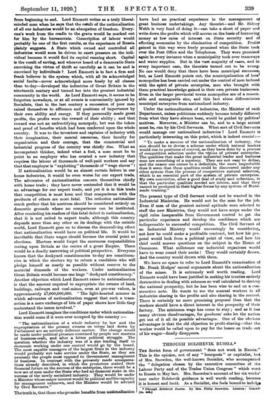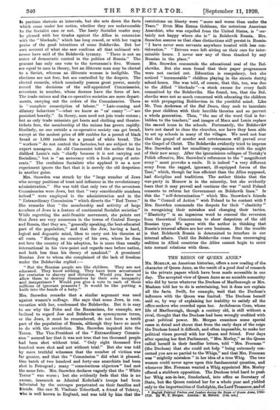THROUGH BOLSHEVIK RUSSIA.*
Tax Soviet form of government " does not work in Russia." This is the opinion, not of any " bourgeois " or capitalist, but of Mrs. Snowden, the well-known Socialist, who accompanied the " delegation chosen by the executive committee of the Labour Party and of the Trades Union Congress " which wont to Russia in May last. Mrs. Snowden's account of her six weeks' tour under Bolshevik guidance is well worth reading, because it is honest and lucid. As a Socialist, she feels bound to indulge • Through Bolshevik Russia. By Mrs. Philip Snowden. London : Caere 11. 16a. ast-J
In partisan rhetoric at intervals, but she sets down the facts which came under her- notice, whether they are unfavourable to the Socialist case or not. The hasty Socialist reader may
be pleased with her tirades against the Allies in connexion with the " blockade," which has long ceased, or with her vague
praise of the good intentions of some Bolsheviks. But her own account of what she saw confirms all that unbiased wit- nesses have said of the Bolshevik tyranny. There is not an ounce of democratic control in the politics of Russia." The peasant has only one vote to the townsman's five. Women are equal to men in theory, but an illiterate man may be elected to a Soviet, whereas an illiterate woman is ineligible. The elections are not free, but are controlled by the despots. The elected councils, which nominally possess great power, merely record the decisions of the self-appointed Commissaries, seventeen in number, whose decrees have the force of law. The trade unions and the co-operative societies are mere depart- ments, carrying out the orders of the Commissaries. There is complete conscription of labour." " Late-coming and dilatory behaviour "—what we know as " ca' canny "—" are punished heavily." In theory, men need not join trade unions ; but as only trade unionists get boots and clothing and theatre- tickets free, the membership of the unions has grown rapidly. Similarly, no one outside a co-operative society can get bread, except at the modest price of 400 roubles for a pound of black bread or 1,000 roubles for a pound of white bread. The " workers " do not control the factories, but are subject to the expert managers. An old Communist told the author that he disliked Lenin's rule " chiefly because it is not carrying out Socialism," but is " an autocracy with a fresh group of auto- crats." The credulous Socialists who applaud it as a new experiment ignore the fact that it is merely the old despotism in another guise.
Mrs. Snowden was struck by the " large number of Jews who occupy positions of trust and influence in the revolutionary administration." She was told that only two of the seventeen Commissaries were Jews, but that " very considerable numbers indeed " were employed in the administration and in the Extraordinary Commission " which directs the " Red Terror." She remarks that the membership and activity of large numbers of Jews is a feature of continental Socialist societies."
While regretting the anti-Semitic movement, she points out that Jews are very numerous in the towns of Central Europe and Russia, that they are, "generally speaking, the best-educated part of the population," and that the Jew, having a hard, logical and dogmatic mind, likes to carry out his theories at all costs. " Having no country of his own, where he does not love the country of his adoption, he is more than usually international in his view-point and regards race before nation, and both less than his theory of mankind." A prominent Russian Jew to whom she complained of the lack of freedom under the Bolsheviks replied :—
" But the Russian people are like children. They are not educated. They know nothing. They have been accustomed for centuries to slavery and dictation. Would you have us allow them to destroy themselves by their own incapacity and inexperience ? Would you give a vote to each of these millions of ignorant peasants ? It would be like putting a knife into the hands of a baby."
Mrs. Snowden remarks that a similar argument was used against women's suffrage. She says that some Jews, in con_ versation with her, condemned the Bolsheviks. But it is easy to see why the Poles and the Rumanians, for example, are inclined to regard Jew and Bolshevik as synonymous terms, or the Jews, it must be remembered, do not form a tenth part of the population of Russia, although they have so much to do with the revolution. Mrs. Snowden inquired into the Terror. The Vice-President of the " Extraordinary Commis. sion " assured her that it was not true that ten thousand people had been shot without trial. " Only eight thousand five hundred were shot and not without trial." But she was told by more truthful witnesses that the number of victims was far greater, and that the " Commission " did what it pleased.
One batch of two hundred and forty-one anarchists had been shot in Petrograd ; many " conscientious objectors" had met the same fate. Mrs. Snowden declares vaguely that the " White Terror " was worse ; but she evidently feels that this is no excuse, inasmuch as Admiral Koltchak's troops had been infuriated by the outrages perpetrated on their families and friends. She saw M. Vladimir Tchertkoff, a friend of Tolstoy, who is well known in England, and was told by him that the restrictions on liberty were " more and worse than under the Tsars." Even Miss Emma Goldman, the notorious American Anarchist, who was expelled from the United States, is " cer- tainly not happy where she is " in Bolshevik Russia. Mrs. Snowden assures us that class distinctions still persist in Russia. " I have never seen servants anywhere treated with less con-
sideration." Drivers were left sitting on their cars for inter- minable hours. I never saw any of them thanked by any Russian in the place."
Mrs. Snowden commends the educational zeal of the Bol- sheviks. But she soon found that their paper programmes were not carried out. Education is compulsory, but she noticed " innumerable " children playing in the streets duri_P_g school-hours. She was told, of course, that this, too, was due to the Allied " blockade "—a stock excuse for every fault committed by the Bolsheviks. She found, too, that the Bol- sheviks were not so much concerned with educating the children as with propagating Bolshevism in the youthful mind. Like Mr. Tom Anderson of the Red Dawn, they seek to inoculate the poor children with their horrible theories and so pervert a whole generation. Thus, " the use of the word God is for- bidden to the teachers," and images of Marx and Lenin replace the sacred icons in the schools. Fortunately, the Bolsheviks have not dared to close the churches, nor have they been able to set up schools in many of the villages. We need not fear that the gospel of murder and covetousness will prevail over the Gospel of Christ. The Bolsheviks evidently tried to impress Mrs. Snowden and her unmilitary companions with the might of their new army. After the ignominious collapse of Trotsky's Polish offensive, Mrs. Snowden's references to the " magnificent army " must provoke a smile. It is indeed " a very different army from the ragged, ignorant, ill-equipped forces of the Tsar," which, though far less efficient than the Allies supposed, had discipline and traditions. The author thinks that the war-party in Moscow is in the minority, but she evidently fears that it may prevail and continue the war " until Poland consents to reform her Government on Bolshevik lines." Is this the " self-determination " which Mrs. Snowden's friends in the " Council of Action " wish Poland to be content with ? Mrs. Snowden commends the despots for their " elasticity " in recognizing their mistakes and changing their tactics. " Elasticity " is an ingenious word to conceal the reversion from theoretical Communism to sheer despotism of the old Russian type. We agree with the author in thinking that Russia's internal affairs are her own business. But the trouble is that Bolshevik Russia is determined to interfere in our internal affairs. Until the Bolsheviks cease from encouraging sedition in Allied countries the Allies cannot begin to enter into normal relations with them.



































 Previous page
Previous page